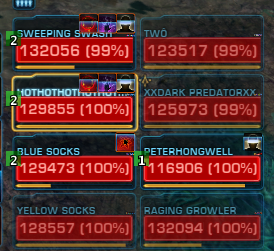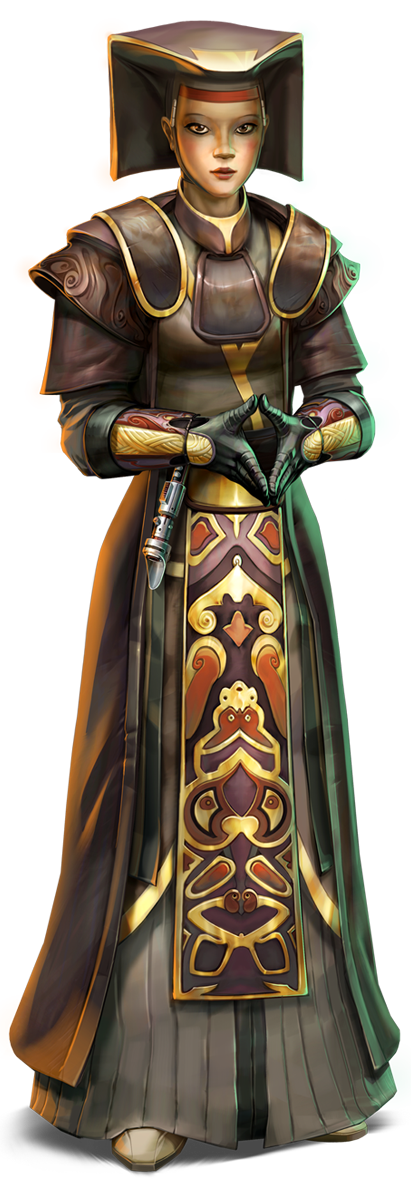SWTOR: Complete Guide to Cleansing in PvP (5.9)
Revisions
| Date | Notes |
|---|---|
| 2018-12-13 | Layout/visual improvements throughout. |
| 2018-06-20 | Originally published. |
Glossary
| Term | Definition |
|---|---|
| CC | crowd control, an umbrella term for abilities/effects that incapacitate enemies or hamper their movement |
| debuffs | umbrella term for negative effects from offensive abilities (e.g., armor reduction) |
| DCD | defensive cooldown |
| DPS | damage per second, also a synonym for damage dealer |
| hard stun | 2.5–4-second CC that doesn't break on damage taken (e.g., Debilitate or Electrocute) |
| LoS | line of sight |
| mez | 4–8-second CC that breaks on damage taken (e.g., Flash Bang or Low Slash) |
| root | type of CC that prevents enemy movement |
| slow | type of CC that slows enemy movement |
Introduction
Three advanced classes in SWTOR have cleanses, abilities which can dispel certain negative effects like CCs and debuffs. Two tech-based classes, Operative and Mercenary, and one Force-based class, Sorcerer (and their respective Republic mirrors), have cleanses, as given in the table below.
| Advanced Class | Cleanse |
|---|---|
| Sorcerer | Expunge |
| Sage | Restoration |
| Operative | Toxin Scan |
| Scoundrel | Triage |
| Mercenary | Cure |
| Commando | Field Aid |
There are four types of negative effect: Force, mental, tech and physical. There are also untyped effects, which cannot be cleansed (e.g., Carbonize and Neural Surge).
All Operatives and Mercenaries can cleanse tech and physical effects. Medicine Operatives and Bodyguard Mercenaries can also cleanse mental effects.
All Sorcerers can cleanse Force and mental effects. Corruption Sorcerers can also cleanse physical effects.
This is summarised in the table below.
| Discipline | Force | Mental | Tech | Physical |
|---|---|---|---|---|
| Corruption Sorcerer | ✔ | ✔ | ✔ | |
| DPS Sorcerer | ✔ | ✔ | ||
| Medicine Operative | ✔ | ✔ | ✔ | |
| DPS Operative | ✔ | ✔ | ||
| Bodyguard Mercenary | ✔ | ✔ | ✔ | |
| DPS Mercenary | ✔ | ✔ |
Cleansable Effects
Hard stuns, mezzes, roots, slows and some debuffs can be cleansed.
One drawback to cleanses is that they do not prioritize dispelling hard stuns and mezzes over other effects. For example, if you try to dispel the effects of Flash Bang (Flash Grenade) on an ally who is also rooted and slowed, there is a chance those lesser effects will dispelled instead. Cleanses are also on a 12-second cooldown so should be used thoughtfully.
While you can cleanse allies of stuns and mezzes, you cannot cleanse yourself while incapacitated. You can cleanse yourself of roots, slows and other effects, however.
| Key |
|---|
| Force |
| Mental |
| Tech |
| Physical |
| Cannot be cleansed |
The following tables list all CCs in the game. The tables are colour coded by debuff type, allowing you to quickly identify which CCs are cleansable by which discipline. If a CC is attached to a utility, this is indicated, e.g., Whirlwind (Haunted Dreams). For brevity, Imperial names are listed only.
| Hard Stun | Mez | Root | Slow |
|---|---|---|---|
 |
 |
 |
 |
| Electrocute | Static Barrier (Backlash) | Overload (Electric Bindings) | Affliction (Conspiring Force) |
| Whirlwind (Haunted Dreams) | Whirlwind | Enfeebling Strike (utility) | Force Slow |
| Creeping Terror | Lightning Bolt | ||
| Enfeebling Strike (utility) | |||
| Hard Stun | Mez | Root | Slow |
|---|---|---|---|
 |
 |
 |
 |
| Electrocute | Whirlwind | Force Pull (Hand of Darkness) | Force Slow |
| Spike | Mind Trap | Leeching Strike (Hand of Darkness) | Force Speed (Disjunction) |
| Whirlwind (Haunted Dreams) | Low Slash | Overload (Electric Bindings) | Wither |
| Creeping Terror | Lacerate, Thrash, Voltaic Slash (Snaring Slashes) | ||
| Hard Stun | Mez | Root | Slow |
|---|---|---|---|
 |
 |
 |
 |
| Backhand | Intimidating Roar | Hew | Chilling Scream |
| Force Choke | Ravage (Overwhelm) | Force Crush | |
| Saber Throw (Thrown Gauntlet) | Smash (Crushing Fist) | ||
| Hard Stun | Mez | Root | Slow |
|---|---|---|---|
 |
 |
 |
 |
| Force Choke | Intimidating Roar | Ravage (Overwhelm) | Force Crush |
| Crippling Slash (Maiming Reach) | Crippling Slash | ||
| Devastating Blast, Force Charge, Force Rend, Obliterate (Interceptor) | |||
| Dual Saber Throw | |||
| Hard Stun | Mez | Root | Slow |
|---|---|---|---|
 |
 |
 |
 |
| Debilitate | Flash Bang | Backstab, Lethal Strike (Jarring Strike) | Corrosive Grenade |
| Sleep Dart | Crippling Slice | Sever Tendon | |
| Sever Tendon (Precision Instruments) | Overload Shot, Noxious Knives (Curbing Strategies) | ||
| Hard Stun | Mez | Root | Slow |
|---|---|---|---|
 |
 |
 |
 |
| EMP Discharge | Flash Bang | Cover Pulse | EMP Discharge |
| Maim | Leg Shot | Leg Shot (Debilitating Shots) | |
| Scatter Bombs | |||
| Hard Stun | Mez | Root | Slow |
|---|---|---|---|
 |
 |
 |
 |
| Electro Dart | Concussion Missile | Missile Blast (Afterburners) | Jet Boost |
| Electro Net | |||
| Hard Stun | Root | Slow | |
|---|---|---|---|
 |
 |
 |
|
| Electro Dart | Flaming Fist | Flame Burst, Flame Sweep, Magnetic Blast (Suppressive Tools) | |
| Flaming Fist, Rocket Punch (Reel and Rattle) | Grapple (Adaptable Assailant) | Neural Dart (Suppressive Tools) | |
| Carbonize | Stealth Scan (Adaptable Assailant) | Searing Wave | |
| Shatter Slug (Mutilating Shards) | |||
Effect Icons
The next step is to identify the icons for various effects, shown in the player/target debuff trays and on the operations frame. These are given in the table below.
| Icon | Effect |
|---|---|
 |
This icon indicates a hard stun, regardless of its type. |
 |
This icon is associated with most mezzes, including Flash Bang (tech), Flash Grenade (tech), Sleep Dart (mental), Mind Trap (mental), Awe (mental) and Static Barrier (Force), the infamous “bubble stun”. |
 |
This icon indicates the effects of mezzes like Force Lift (Force), Whirlwind (Force) and Low Slash (physical). |
 |
This icon is exclusive to Intimidating Roar (mental), a mez. |
 |
This icon indicates a root, regardless of its type. |
 |
This icon indicates a slow, regardless of its type. |
Settings and User Interface
Operations Frame

Fig. 1: Operations frame with enlarged debuff icons.
You can optimise your UI to see debuffs more clearly on the operations frame. Some recommended settings follow.
- Open Interface Editor,
- select Operations Frames,
- change Debuff Scale to 0.6,
- change Buff Scale to 0.05,
- change Health Width to 144,
- change Health Height to 32,
- check Show Health Text then
- check Show Only Removable Debuffs.
Sound
Unlike other MMOs, SWTOR boasts excellent visual and sound design. These cues give vital information in PvP so we recommend spending some time adjusting in-game sound levels so you can pick up on them.
You can tell, for example, whether an ally was hit by a Mercenary’s Concussion Missile or a Sorcerer’s Whirlwind by the animations associated with the abilities and their effects or their distinctive sound effects. Learn the animations and sound effects associated with each ability to help you make accurate split-second decisions.
- Open Preferences,
- select Sound,
- check Enable Sound,
- adjust Master Volume,
- adjust Sound FX Volume,
- adjust Ambient Volume,
- adjust Music Volume and
- adjust Voice Volume.
Everyone’s audio setup is different so specific values are not given. However, after adjusting your Master Volume to a comfortable level, ensure your Sound FX Volume is higher than your Ambient Volume, Music Volume and Voice Volume.
Cleansing Priority

The cleansing priority (for healers and DPS) is
- mezzes and hard stuns,
- roots,
- slows then
- misc. debuffs.
Mezzes and hard stuns are commonly used in PvP to shut players down or to make it easier to kill targets. Because mezzes and hard stuns prevent allies from using important abilities, cleansing these is your first priority.
Consider a healer under the effects of Flash Bang, unable to cast to save a player, or a hard stunned DPS who can’t activate a DCD to save themselves: cleansing here has huge potential impact. Cleansing a player of a mez or hard stun also lets them save their CC breaker (typically on a 2-minute cooldown) for later in the fight.
Lastly, remember that mezzes and hard stuns have relatively long cooldowns: by saving your cleanse for these CCs, you deny the enemy a valuable window of opportunity to get a kill.
Roots are your next priority. When a player is rooted, they can still use important abilities but cannot move. Cleansing roots is important if a player needs to kite, LoS, stay in melee range, etc. If a teammate is struggling to reposition, e.g., a tank is rooted out of Guard range, it is worth cleansing a root.
Slows and debuffs are of lowest priority because they will rarely be the direct cause of your death or a teammate’s death. They are also attached to basic class rotations, often spammable or easily reapplied. Therefore, cleansing them has little value. It is almost always better to save your cleanse for mezzes, hard stuns or roots.
Conclusion

Cleansing quickly and accurately takes practice. Take some time to adjust your UI and sound settings. Pay attention to the debuff trays and operations frame and listen out for audio cues. Learn to recognise other classes’ abilities so you can predict incoming CCs. Try not to waste your cleanse on effects you can’t dispel.
We hope this serves as both an introductory guide for casual players and a valuable reference for more seasoned players looking to improve their performance in solo and group ranked. Cleanses are powerful: learning to use them will increase your survivability and that of your teammates, giving you an edge.
About the Authors
I’m Hottie. I’m a Medicine Operative main but dabble in other classes as well. I’ve been playing SWTOR for three years and am every bit as passionate about the game now as when I started. I’ve written a number of guides and articles on PvP and related topics. My experience playing ranked PvP across multiple seasons has given me valuable insights into game mechanics and other, more esoteric aspects of PvP. You can watch me stream my gameplay over on Twitch and follow me on Twitter. Lastly, I want to give a shoutout to my friends doc and Puddlejumper for sharing their knowledge and for their continued support.
I’m rambol, also a Medicine Operative main who’s been having a tempestuous affair with SWTOR since its beta. I’m chief editor of rambol.net, where I collaborate with my friends to produce PvP-focused content for SWTOR. While I struggle to maintain two stacks of Kolto Probe on four teammates at once, my knack for copyediting and tenuous grasp of physics and mathematics sometimes prove useful.
